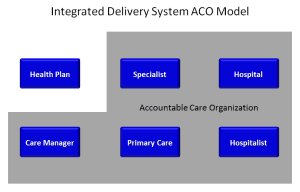Determining the right IDS model requires assessing the motivation of the physicians and hospital considering partnering in an IDS. Failures will occur if motivations / incentives are not aligned and expectations / accountabilities are not formalized.
Successful IDS models can physicians and hospitals the opportunity to partner together to impact the quality, availability and cost of healthcare in their community.
There are several IDS models, three are summarized here:
Direct Employment: Physicians are employed by a hospital and assigned their professional fees to that hospital. Compensation must be fair market value and may include incentive compensation models.
Foundation Model: Tends to be an appealing model where physicians desire to retain more independence and autonomy than they perceive would be available in a Direct Employment model.
MSO Model: MSO may be either an independent entity or a subsidiary of the hospital. Physicians can purchase services and lease assets from the MSO with the goal being lower overhead due to achieving economies of scale.
There are several operational, financial and legal pros and cons to these models:
Direct Employment
· Compensation and benefits directly from hospital
· Professional fees assigned to hospital
· Potential for Provider Based Billing
· Compensation must be fair market value, can include incentive programs
· Physicians may only receive compensation associated with professional services provided directly by that provider
· Physician leadership and management skills development essential
Foundation Model
· Foundation owns the revenue and clinics
· Foundation is typically not-for-profit, achieving tax-exempt status ties to several requirements
o Limit physician representation on the board to no more than 20%
o Tied to whether the Foundation and hospital provide a “system of care”
· Physicians typically serve on management committees Compensation
· Physicians enter into a PSA agreement to provide professional services at the Foundation clinic sites
· Often the preferred model when physicians desire to remain more independent than they may be as hospital employees
· Physician organization responsible for developing their own compensation and benefit structure
· Foundation pays a rate to the Physician Organization for professional services ($/wRVU)
· Goals of the Physician Group may not always align with the goals of the Foundation
MSO Model
· MSO may provide management and administrative services to a closed or open physician population
· MSO may acquire asset from physicians joining the MSO and lease the use of these assets back to the physicians
· Goal is to achieve economies of scale for physicians purchasing services/assets
· Professional fees are retained by the physicians
· If MSO is not hospital owned – Physicians may provide ancillary services and retain the associated fees

Be the first to comment on "Integrated delivery systems"